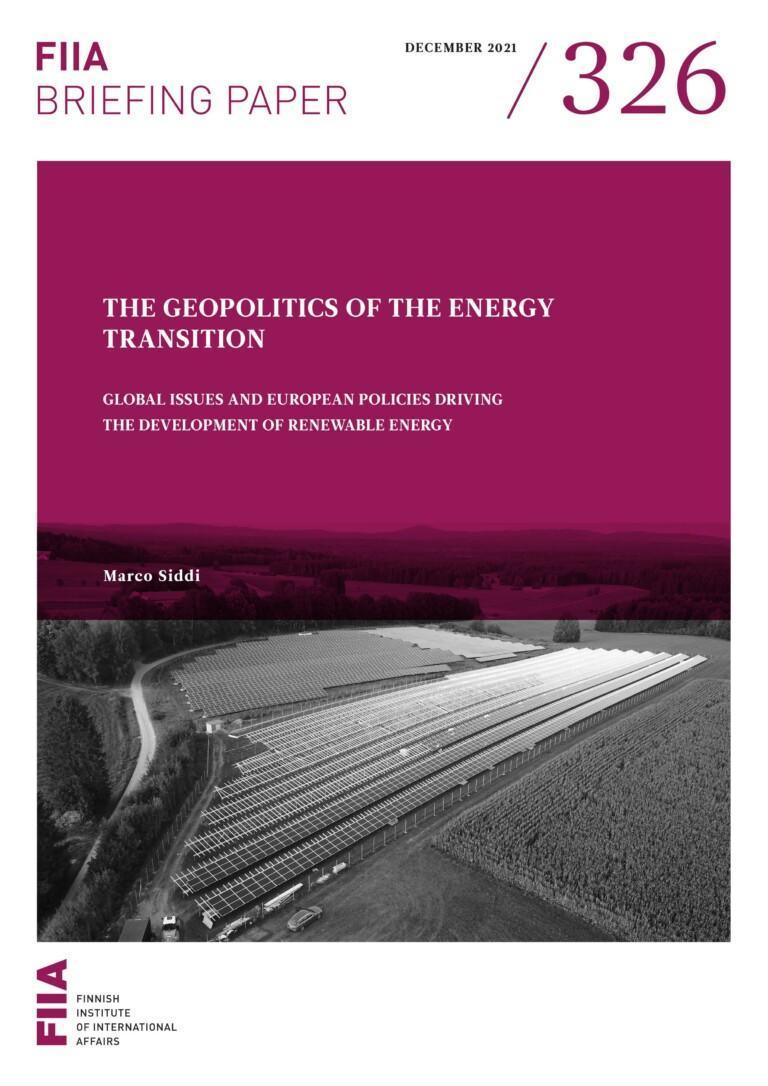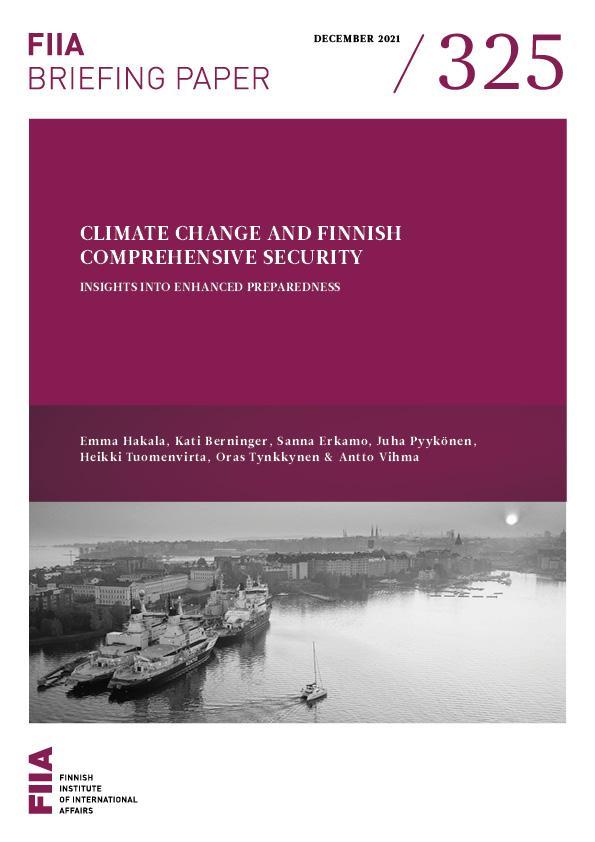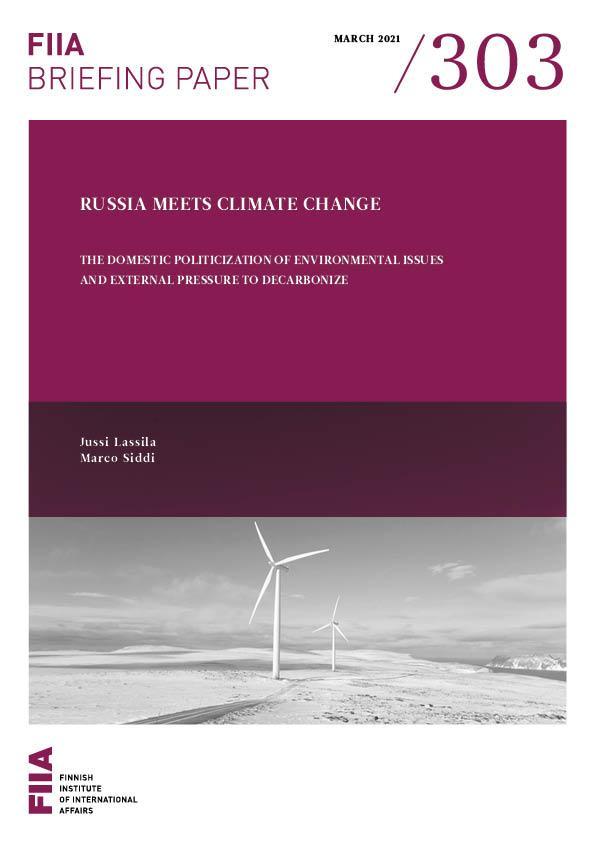Fighting climate change makes a green energy transition imperative. The transition will have significant geopolitical consequences, notably a shift of power away from fossil fuel producers that do not adapt to a decarbonizing world.
Access to critical minerals, rare earth elements and storage technology for renewable energy applications will be essential, and will determine the new geopolitics of energy. Some critical elements such as cobalt are only found in a few areas of the globe.
Hydrogen is a carbon-free energy carrier that will allow the storage and dispatch of energy produced by intermittent renewable sources such as solar and wind. While hydrogen trade could lead to new dependencies, it will provide a back-up for the electricity system and strengthen energy security.
Currently, China is a leader in securing resources for the energy transition. The Belt and Road Initiative could consolidate its position.
As it strives to be a leader in the energy transition, the EU is focusing on securing relevant supply chains, deploying technology and developing hydrogen capacity.
International cooperation will accelerate the transition and give the world a chance to avoid catastrophic climate change.
Introduction
Increasing evidence of the climate crisis[1] and the international agreements that aim to tackle it, notably the Paris Climate Agreement, are leading most of the Global North to embark on an energy transition. The transition can be defined as the shift by the energy sector away from fossil fuel-based systems of energy production and consumption to fossil-free sources, such as wind, solar and – depending on national policy choices – nuclear energy, and storage systems based on lithium-ion batteries and hydrogen. The energy transition will be characterized by the growing penetration of renewables into the energy supply mix, electrification, and improvements in energy storage.
Thanks to renewables, energy production will become more decentralized. Smart grids using digital technologies will have to be built to react quickly to local changes in renewable energy production and usage. As governments pursue the transition, new regulatory frameworks will be formulated to govern the sector and considerable investments are expected.
Economic systems based on renewable energy will be far less impactful on the climate than those based on fossil fuels (i.e. coal, oil and gas). In the coming decades, the transition will take place at different paces in different regions of the world. The richer economies of the Global North will lead the way, whereas several countries of the Global South may still increase their fossil fuel consumption in the coming decade, particularly if they do not receive sufficient economic aid and technology transfers from the Global North. Importantly, Chinese emissions are estimated to peak in the latter half of the 2020s. Major fossil fuel producers will have to adapt or face considerable economic losses. Meanwhile, countries which control the raw materials that are necessary for the energy transition (rare earth and other critical elements, cobalt, and lithium), as well as the related supply chains and technological know-how, will acquire economic and geopolitical importance.
As a result of the decentralization of energy production, the geopolitics of renewable energy will be less conflictual than the geopolitics of fossil fuels. However, new dependencies will develop – for instance, on countries that control the supply chain of rare earth elements. Different kinds of environmental issues will emerge, albeit less acute than the prospects of destruction caused by carbon emissions.
This Briefing Paper investigates some of the main geopolitical developments and issues related to the energy transition. It starts with a brief assessment of the main ‘winners’ and ‘losers’ of the transition, followed by a discussion on the new geopolitics of renewable energy, with a focus on critical minerals. The role of hydrogen as a carbon-free energy carrier is also discussed. Due to their impact on supply chains for green technology, China and its Belt and Road Initiative deserve special attention. The paper concludes by briefly reviewing the main EU policies concerning the geopolitics of renewables, including the EU’s current initiatives.
Winners and losers
It is generally assumed that the energy transition will cause serious economic losses for fossil fuel producers such as Saudi Arabia, Venezuela, Algeria, Nigeria, Russia and Norway, and weaken their geopolitical influence. The extent of the losses will depend on the speed of the transition and the capability of these countries to adapt and diversify their economies. The list of potential losers is probably longer than some analyses suggest. For instance, it also includes the large hydrocarbon sector in the United States – following the ‘shale revolution’, the US has become a major exporter of fossil fuels. Countries that currently benefit economically and geopolitically from the transit of fossil fuels on their territory, such as Ukraine and Georgia, can also be counted among the losers.[2]

Differences exist between fossil fuel producers concerning the size and timing of the losses that they will incur due to the energy transition. Those with lower production costs and lower break-even prices for oil, such as Saudi Arabia and Russia respectively, will be more resilient and competitive in the shrinking markets. Major producers such as Russia and Saudi Arabia, and potentially the US, may also cooperate in the OPEC+ format in order to reduce price volatility, as we have seen several times since 2016.
Moreover, oil and gas producers that are better positioned for exports to the Asian market – where demand is expected to grow during the next decade – can still make large profits. For instance, Qatar’s outlook is positive thanks to its relative proximity to East Asian markets and the fact that it delivers its gas by tankers, as liquefied natural gas (LNG), and can easily reorient its exports. Conversely, Algeria’s gas exports rely on pipelines, which cannot easily be reoriented, and they supply the European market, which is expected to decarbonize earlier.
Due to the expected rise in carbon prices and the introduction of carbon border taxes in the future, carbon intensity in the production process (namely the greenhouse gas emissions per unit of energy produced) will also play a role. For instance, Saudi Arabia has managed to reduce its carbon intensity by decreasing gas flaring and integrating solar energy into oil and gas processing. Conversely, oil producers such as Iraq and Algeria have a higher carbon intensity.[3]
On the other hand, large importers of fossil fuels – such as China, the European Union and Japan – will benefit from the energy transition, particularly if they continue to acquire the necessary technology and resources. When China reduces its dependence on oil, it will also decrease its vulnerability to disruptions at maritime choke points such as the Strait of Malacca. Countries where the world’s leading clean-energy companies are located are likely to profit considerably from the transition.
Even states that currently rely on oil and gas export revenues, such as Russia and Middle Eastern and North African (MENA) states, can reduce losses and potentially gain from the transition if they adapt their economies. Both Russia and MENA countries have great potential for renewable energy production. Russia also controls large reserves of minerals that are critical for the transition.[4] For these actors, a key challenge lies in overcoming the ‘hydrocarbon culture’ and the related vested interests that have shaped their economies and societies for decades, or even centuries.
Most importantly, considering the catastrophic effects that uncontrolled climate change would have on all human economies and societies, every country eventually stands to gain from transitioning away from fossil fuels.
A new geopolitics of renewables?
The geopolitics of renewable energy will feature a new type of competition concerning sources and technologies. Access to critical minerals and rare earth elements for the production of high-tech and renewable energy applications (wind turbines, solar panels, efficiency lighting) will be essential. Rare earths include 17 elements in the periodic table, most of which are found in high geographic concentration. China is in a dominant position in both the production and processing of rare earths, and controls a substantial share of relevant global supply chains. China is also prominent in renewable technology and battery manufacturing. It now produces more than 70% of the world’s solar modules and hosts nearly half of the world’s wind turbine manufacturing capacity.[5]
While rare earths are also found outside China’s territory, the economic viability and toxicity of extraction and processing make it difficult to develop alternative supply chains. The most significant rare earth mining corporation outside China, Lynas, is based in Australia; Beijing’s attempt to buy a 51% stake in it was blocked by the Australian government in 2009 for strategic reasons. The US lags behind in this field. Its main rare earth mining corporation, Molycorp, filed for bankruptcy in 2015, and later underwent restructuring. It takes at least a decade to bring new rare earth mines into operation because it is a capital-intensive endeavour. Meanwhile, China has consolidated the position of its six state-owned companies dealing with critical minerals, and continues to have lower material costs, as well as greater ‘tolerance’ for the high environmental impact of mining.
China’s boycott of rare earth exports to Japan between 2010 and 2015, the previous US President Donald Trump’s attempts to impose tariffs on rare earths, and the disruptions in the supply chains caused by the Covid-19 pandemic highlight that these supply chains are exposed to international crises and tensions.[6] China’s boycott against Japan began after an incident near the contested Senkaku/Diaoyu Islands. It led to a price spike on several elements, and it only ended in 2015 after Japan, the EU and the US filed complaints with the World Trade Organization (WTO). As of 2021, it seems unlikely that the WTO would now manage to defuse a similar dispute, as trade wars between the US and China have undermined its centrality.
The US stance under Donald Trump contributed to the politicization of supply chains. In the summer of 2018, Trump included rare earths in a list of Chinese products that were to be subject to tariffs. As the US imported 78% of its rare-earth compounds from China, the tariffs would have harmed the US tech industry. Hence, they were removed from the final list of goods subject to tariffs in September 2018.
Storing energy and electric vehicles: the scramble for lithium and cobalt
In addition to rare earths, lithium and cobalt are chemical elements of essential importance for the energy transition. Lithium is used in lithium-ion batteries in electric cars, as well as in portable electronic devices and grid storage appliances. It is found in high concentrations particularly in the “lithium triangle” of Argentina, Bolivia and Chile, as well as in Australia (now the main producer) and in China, which plays a key role in processing and supply. In Europe, some deposits of ore lithium are located in Germany, the Czech Republic and Serbia. Lithium extraction is problematic as it causes environmental degradation and water stress, and requires high energy use. It may also exacerbate inequalities and undermine the livelihood of local communities, as highlighted by recent protests near the Atacama mine in Chile, and in Serbia.
It is widely accepted that global lithium reserves are adequate to sustain growing demand from the electric vehicle industry. However, temporary supply shortages might occur due to potential spikes in lithium demand in the short term.[7]

Cobalt is used in batteries, smartphones, laptops, and electric cars. Around 70% of current cobalt extraction and the largest reserves are located in the Democratic Republic of Congo (DRC). Chinese companies control nearly half of the global production of refined cobalt. In the DRC, Beijing has secured a central position in cobalt mining. China is also the main consumer of cobalt and the main supplier to the United States. Europe hosts around one fourth of global cobalt refining capacity, mainly in Finland.
Cobalt extraction is concentrated in the hands of a few companies and is highly controversial. In 2016, Amnesty International reported that over 100,000 artisanal miners, including numerous children, dug out cobalt without any safety precautions in the DRC. As a consequence, cobalt enters the supply chain of multinational companies through a highly exploitative process and gross human rights abuses.[8]
Due to the rise in sales of electric cars, competition in the development and production of lithium-ion batteries has occurred between China, the US and Europe. Currently, China is ahead of competitors in the construction of new battery gigafactories. Meanwhile, the US and the EU have published lists of critical minerals, including lithium and cobalt, which they consider essential for battery production and the energy transition. Japan maintains a stockpile of minerals that it qualifies as critical.
Hydrogen: the energy carrier of the future?
Hydrogen is a highly promising energy carrier in the context of the energy transition. On Earth, it is nearly always combined with other elements, as in water molecules, H20. However, if it is freed from its compound (for example, by splitting water molecules through electrolysis), it can be converted into electricity through fuel cells, combusted to produce heat or power or used as feedstock. If it is burned in an engine or combined with oxygen in a fuel cell, hydrogen produces heat or electricity, and only water vapour as a by-product, with no carbon emissions.
Hydrogen is an energy carrier, not an energy source, and needs to be produced using energy sources such as gas, coal, nuclear power or renewables. Various colours are used to describe the different production pathways: “grey” hydrogen from natural gas and coal; “green” hydrogen from renewable energy, produced through electrolysis; “purple” hydrogen from nuclear electricity; and “blue hydrogen” from gas and coal but with carbon capture and storage (CCS) technologies – which allow carbon dioxide to be captured before it enters the atmosphere. While today most hydrogen is produced from fossil fuels (without CCS), it is especially green and potentially blue and purple hydrogen that hold promise for the energy transition.
Green hydrogen allows renewable energy produced from intermittent sources such as solar and wind to be stored and dispatched. It can store such energy much longer than batteries. Hydrogen can be particularly useful for decarbonizing sectors such as heavy industry and long-haul transport.
Currently, producing green hydrogen is more costly than other types of hydrogen. However, costs are coming down and several countries are allocating more and more investments to hydrogen technologies. China has already managed to lower the production costs of electrolysers considerably. Hydrogen can be produced almost anywhere in the world, and many countries will be prosumers, both producers and consumers. However, some countries have better resources, access to technologies, and can become larger and cheaper producers.
Countries such as Australia, Chile and Morocco aim to become exporters of hydrogen, whereas Japan, Korea and Germany are preparing to become large-scale importers. Several countries in the Middle East and Russia have large-scale potential for hydrogen production, and see blue and green hydrogen as an opportunity to preserve their role as key energy suppliers.
Transportation costs and infrastructure will play an important role in hydrogen trade, making it somewhat similar to gas trade today. For transportation, pure hydrogen can be liquefied, but this involves cooling it to -252°C and using a lot of energy. It is more practical to convert it into a compound, such as ammonia, but such conversions are expensive. Pipeline transport could make more sense, especially if existing pipelines can be repurposed for hydrogen transport. For example, when the demand for gas in Europe decreases, some of the existing thick network of pipelines could be adapted to transport green or blue hydrogen.
To an extent, hydrogen trade can lead to new dependencies. China’s lower production costs of electrolysers can stir fears in the West that Beijing will dominate yet another new energy technology. However, hydrogen trade will be less asymmetric than gas or oil trade. As hydrogen can be produced almost anywhere in the world and many countries will be prosumers, it will be nearly impossible for exporters to weaponize hydrogen trade. If anything, hydrogen trade will provide a back-up for the electricity system and strengthen energy security.[9]
China’s Belt and Road Initiative
As argued, China is in a favourable position in the geopolitics of renewables and of the energy transition. It has access to vast raw material resources, it largely controls supply chains, and occupies a strong position in the processing of critical minerals and the development of photovoltaic and wind turbine technology. In addition, it is promoting its Belt and Road Initiative (BRI), a project with considerable investments that are meant to unite Eurasia and Africa (and arguably Latin America) into a common space of trade, infrastructure and digital connectivity. To do this, the BRI requires large quantities of critical minerals.
Traditional industrial powers, particularly the US, have taken a critical stance vis-à-vis the BRI, not least because it poses a serious geopolitical challenge. Having China as the main investor, the BRI is helping Beijing to forge a global network of partnerships. There are widespread concerns that, while Chinese authorities talk of the BRI as a ‘win-win’ initiative, China’s partners tend to be pushed into debt and dependence on Beijing.
On the other hand, Western economic prescriptions have sometimes led countries in the Global South to accumulate debt and develop economic dependencies. Arguably, China offers an alternative to poorer nations that do not want to rely solely on Western finance and institutions.
Where does the EU stand?
As it strives to be a leader and role model in the energy transition, the EU has increased its focus on accessing the necessary raw materials. The EU’s focus on supply chains of critical minerals can be seen as part of the ‘geopolitical approach’ advocated by European Commission President Ursula von der Leyen.
Building on its 2008 Raw Materials Initiative, the European Commission has published a list of critical raw materials and identified challenges to their secure and sustainable supply. The EU has launched a European Raw Materials Alliance, which aims to build resilience and strategic autonomy for Europe's rare earth value chains. In 2020, the Commission adopted a Critical Raw Materials Action Plan and subsequently developed a strategic partnership with Canada in this field. In September 2021, the EU-US Trade and Technology Council stated that Brussels and Washington would expand cooperation on critical and emerging technologies and on securing supply chains, with a particular focus on climate and clean technology.
Furthermore, in October 2017, the European Commission launched the European Battery Alliance, a platform for cooperation between industry, member states and the European Investment Bank. A central goal is to secure access to raw materials for batteries from countries outside the EU and boost primary and secondary production within the Union. France and Germany took the lead in this endeavour.[10]
The EU has also taken important steps in the field of hydrogen. Developing hydrogen capacity is seen as an important part of the European Green Deal. In July 2020, the European Commission published the EU Hydrogen Strategy. The strategy announces investments and envisages a phased increase in green hydrogen production, so that it is deployed on a large scale across hard-to-decarbonize sectors after 2030.[11] In their post-Covid-19 recovery plans, several member states have announced considerable investments in hydrogen capacity. However, the availability of sufficient water and enough space for the large-scale expansion of solar and wind energy generation are important limiting factors for hydrogen production. Due to high population density and high consumption, the EU as a whole will quite possibly become an importer of hydrogen.
Conclusion
The energy transition will lead to new configurations in energy trade and geopolitics. While demand for critical minerals and green technologies may lead to new dependencies, the geopolitics of renewable energy will be less conflictual than that of hydrocarbons.
However, countries will decarbonize at different speeds, and hydrocarbon consumption and geopolitics will persist in many parts of the world. Large fossil fuel exporters will have to progressively adapt to the energy transition; if they persevere with their current economic model, their prospects will be bleak.
The worsening climate crisis leaves no room for further delays in the energy transition. Countries of the Global North, which together with China are responsible for the vast majority of historical emissions, should proceed swiftly and share the necessary technologies with poorer countries. International cooperation will accelerate the transition and give the world a chance to avoid catastrophic climate change.
Endnotes
[1] See Intergovernmental Panel on Climate Change, Climate Change 2021 – The Physical Science Basis: Summary for Policymakers, 2021, https://www.ipcc.ch/report/ar6/wg1/downloads/report/IPCC_AR6_WGI_SPM.pdf.
[2] ‘The GeGaLo index: Geopolitical gains and losses after energy transition’, Energy Strategy Reviews, 26, 2019, https://www.sciencedirect.com/science/article/pii/S2211467X19300999.
[3] The Geopolitics of Energy: Out with the Old, In with the New? Oxford Institute for Energy Studies Forum, 126, 41-55, February 2021, https://www.oxfordenergy.org/publications/oxford-energy-forum-the-geopolitics-of-energy-out-with-the-old-and-in-with-the-new-issue-126/.
[4] Marco Siddi, ‘The Geopolitics of the Energy Transition: Essential Issues and Implications for the EU and Russia’, Valdai Club, 18 October 2021, https://valdaiclub.com/a/highlights/the-geopolitics-of-the-energy-transition/.
[5] Michal Meidan, ‘China’s Emergence as a Powerful Player in the Old and New Geopolitics of Energy’, The Oxford Institute for Energy Studies Forum, 126, 12-15, February 2021, https://www.oxfordenergy.org/publications/oxford-energy-forum-the-geopolitics-of-energy-out-with-the-old-and-in-with-the-new-issue-126/; Sophia Kalantzakos, ‘The Race for Critical Minerals in an Era of Geopolitical Realignments’, The International Spectator 55, 3, 1-16, 2020, https://doi.org/10.1080/03932729.2020.1786926.
[6] Andreas Goldthau and Llewelyn Hughes, ‘Protect Global Supply Chains for Low-Carbon Technologies’, 2 September 2020, https://www.nature.com/articles/d41586-020-02499-8.
[7] Daniele Stampatori, Pier Paolo Raimondi and Michel Noussan, ‘Li-Ion Batteries: A Review of a Key Technology for Transport Decarbonization’, Energies, 13, 8-10 and 17-18, 2020, https://www.mdpi.com/1996-1073/13/10/2638.
[8] Amnesty International, ‘This is What We Die for: Human Rights Abuses in the Democratic Republic of Congo Power the Global Trade in Cobalt’, 2016, https://www.amnesty.org/en//data/wordpress/htdocs/wp-content/uploads/2021/05/AFR6231832016ENGLISH.pdf.
[9] Thijs van de Graaf, Indra Overland, Daniel Scholten, Kirsten Westphal, ‘The new oil? The geopolitics and international governance of hydrogen’, Energy Research and Social Science 70, 2020, https://www.sciencedirect.com/science/article/pii/S2214629620302425.
[10] Stampatori et al., 2020. For official sources on EU policies, see: https://ec.europa.eu/growth/sectors/raw-materials/policy-and-strategy-raw-materials_en. On EU-US cooperation, see: https://ec.europa.eu/commission/presscorner/detail/en/STATEMENT_21_4951.
[11] European Commission, ‘A hydrogen strategy for a climate-neutral Europe’, 8 July 2020, https://ec.europa.eu/energy/sites/ener/files/hydrogen_strategy.pdf. For an analysis of the EU Hydrogen Strategy, see Frank Umbach, ‘The EU's Hydrogen Strategy and its Geopolitical Challenges’, ISPI, 21 May 2021, https://www.ispionline.it/it/pubblicazione/eus-hydrogen-strategy-and-its-geopolitical-challenges-30521. For an analysis of the European Green Deal, see Marco Siddi, The European Green Deal: Assessing its current state and future implementation, FIIA Working Paper 114, 2020, https://fiia.fi/en/publication/the-european-green-deal.









